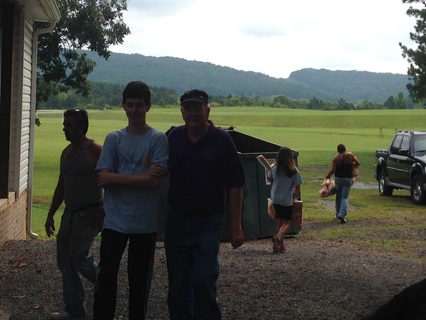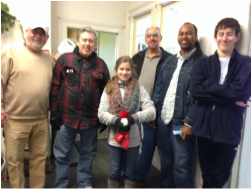
"Moral education is the source of that spiritual equilibrium on which everything else depends and which may be compared to the physical equilibrium of sense of balance without which it is impossible to stand upright or to move into any other position."
-Maria Montessori From Childhood to Adolescence
-Maria Montessori From Childhood to Adolescence

Passion. Valorization. Transformation. Empathy. Social Conscience.
Are these qualities that you want your teen to possess? Does their school experience provide these things on a daily basis? The adolescent program at LifeSong strives to incorporate all of these values within our curriculum. One of the main ways we accomplish this is through service learning. Service learning goes beyond community service. It is a method by which young people learn through active participation in thoughtfully organized experiences that meet a genuine community need. The students coordinate, plan, and make the decisions about their service projects. It is integrated into the academic curriculum and includes time for thinking, talking or writing about their experiences. It also provides opportunities to use academic skills and knowledge in real life situations in their community. It extends student learning beyond the classroom walls and helps to foster the development of a sense of caring for others.
Adolescents are constructing their sense of identity. They need opportunities for the exploration of self, their emerging interests and talents, and the immediate, expansive world around them.
Service learning provides projects that give students the chance to:
· Have meaningful contact with adults
· Make a clear difference, which develops self-confidence and self-respect
· Develop decision making skills while dealing with real problems and social issues
· Experience a variety of roles
· See the concrete outcome of their efforts
· Cooperate with others
· Interact with people different from themselves
· Become contributing citizens by learning habits and fostering an ethic of service
· Become aware of community needs
· Gain a sense of belonging and community membership
· Continue to develop empathy and a sense of caring
Learning through service addresses the needs of the adolescent while also giving them an opportunity to fulfill the needs of others in their own communities. It’s a win-win situation and hopefully starts them on a path of stewardship and service that will be a lifelong commitment. I can’t think of a better way to teach about humanities, the environment and citizenship for the long term benefit of our community and country. It is often said that our children are the future. Teaching them universal values will only help ensure a better path for us all in the years to come.
Written by Maggie Wertz, Adolescent Guide
Are these qualities that you want your teen to possess? Does their school experience provide these things on a daily basis? The adolescent program at LifeSong strives to incorporate all of these values within our curriculum. One of the main ways we accomplish this is through service learning. Service learning goes beyond community service. It is a method by which young people learn through active participation in thoughtfully organized experiences that meet a genuine community need. The students coordinate, plan, and make the decisions about their service projects. It is integrated into the academic curriculum and includes time for thinking, talking or writing about their experiences. It also provides opportunities to use academic skills and knowledge in real life situations in their community. It extends student learning beyond the classroom walls and helps to foster the development of a sense of caring for others.
Adolescents are constructing their sense of identity. They need opportunities for the exploration of self, their emerging interests and talents, and the immediate, expansive world around them.
Service learning provides projects that give students the chance to:
· Have meaningful contact with adults
· Make a clear difference, which develops self-confidence and self-respect
· Develop decision making skills while dealing with real problems and social issues
· Experience a variety of roles
· See the concrete outcome of their efforts
· Cooperate with others
· Interact with people different from themselves
· Become contributing citizens by learning habits and fostering an ethic of service
· Become aware of community needs
· Gain a sense of belonging and community membership
· Continue to develop empathy and a sense of caring
Learning through service addresses the needs of the adolescent while also giving them an opportunity to fulfill the needs of others in their own communities. It’s a win-win situation and hopefully starts them on a path of stewardship and service that will be a lifelong commitment. I can’t think of a better way to teach about humanities, the environment and citizenship for the long term benefit of our community and country. It is often said that our children are the future. Teaching them universal values will only help ensure a better path for us all in the years to come.
Written by Maggie Wertz, Adolescent Guide


 RSS Feed
RSS Feed